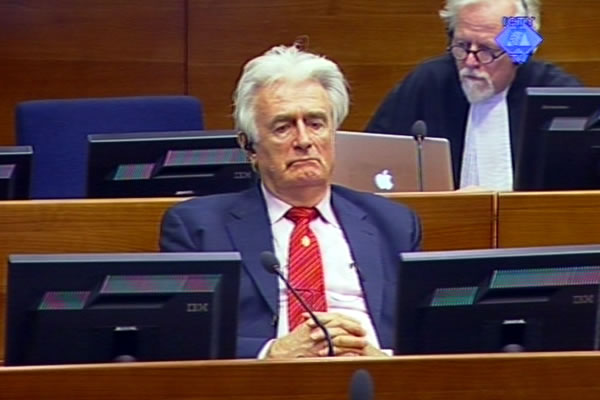Home
KARADZIC INSTRUCTED TO BE ‘MORE MODEST’
The Trial Chamber has ordered the defense to deliver by 14 September 2012 a revised witness list, which should conform to the guidelines presented by the judges today. According to them, the guidelines could 'significantly reduce' the number of hours needed for the defense case
 Radovan Karadzic in the courtroom
Radovan Karadzic in the courtroom At the status conference today, the judges advised Radovan Karadzic to be ‘more modest’, after he had announced he would call 600 defense witnesses. The judges ordered Karadzic to submit a revised witness list in accordance with their guidelines. The judges consider that the guidelines could ‘reduce significantly’ the number of hours needed for the defense case.
Last week, Karadzic submitted a confidential list with the names of 600 defense witnesses, indicating he would need 300 hours to examine them. Karadzic asked for 300 additional hours to refute the 2,300 adjudicated facts from other trials the Trial Chamber has formally taken judicial notice of in his case. Karadzic also indicated he might decide to testify; his evidence would take 30 hours.
Presiding judge Kwon emphasized today that Karadzic’s testimony would ‘have a bigger impact’ if Karadzic were to testify at the beginning of the defense case, before the Trial Chamber heard other defense witnesses. If Karadzic opts to testify, he wouldn’t need to present an introductory statement without making a solemn declaration. If Karadzic insists on the statement, the Trial Chamber would limit the presentation to one-and-a-half hours.
The judges advised Karadzic to ‘be more modest’ in selecting his witnesses and to pick ‘the best’ because ‘the larger the number of witnesses, the bigger the chance the prosecution would hear evidence supporting the charges’. Also, in the Trial Chamber’s view, it makes no sense to re-call witnesses Karadzic has already cross-examined during the prosecution’s case. The judges contend that the defense shouldn’t call evidence on the municipalities not listed in the indictment – Ljubinje, Kozarska Dubica, Derventa, Skender Vakuf, Kupres, Bosanska Gradiska, Bosanski Brod and on the situation in the municipalities where the prison camps were located– Brcko and Banja Luka.In the Trial Chamber’s view, Karadzic shouldn’tcall witnesses testifying about crimes perpetrated by the other warring factions and about the attack on the JNA column in Sarajevo. The defense shouldn’t call evidence that tally with other witnesses’ evidence and evidence about the political and historical background of the conflict in the former Yugoslavia.
As Karadzic said, apparently ‘I understand the indictment differently, if not erroneously’. It is his understanding that he is indicted for ‘creating the goals of the Serb nation that could be accomplished only through war’. In that context, Karadzic contends it is important to show that the Serb side implemented its goals ‘without war, before the war and by political means’. According to Karadzic, the Serb side didn’t want to change the fabric of the Yugoslav state and there was no joint criminal enterprise on the Serb part. Through the witnesses who will testify about the municipalities where there were no crimes he wants to show there was no ‘systematic approach to implementing the Serb goals through war and crimes’, Karadzic explained.
Judge Kwon advised Karadzic to consult with his legal advisors regarding his understanding of the indictment. The presiding judge indicated that the Trial Chamber would decide on the amount of time the defense would have for its case after the accused submits a new witness list revised pursuant to the Trial Chamber’s guidelines on repetition and relevance.
Today the Trial Chamber dismissed Karadzic’s motion for a re-trial because of the prosecution’s delayed disclosure of the documents. The Trial Chamber confirmed that the prosecution had repeatedly violated its obligations, but ruled nevertheless that this did not prejudice the defense.
Linked Reports
- Case : Karadzic
- 2012-08-31 GENOCIDE SURVIVORS SEEK AMICI CURIAE STATUS IN KARADZIC CASE
- 2012-08-28 KARADZIC INTENDS TO CALL 600 DEFENSE WITNESSES
- 2012-07-18 KARADZIC GRANTED LEAVE TO APPEAL
- 2012-09-11 KARADZIC SUBMITS REVISED WITNESS LIST
- 2012-09-19 KARADZIC HAS 300 HOURS FOR HIS CASE
- 2012-09-20 KARADZIC WANTS A SUBPOENA FOR CUTILEIRO
